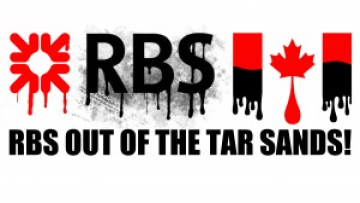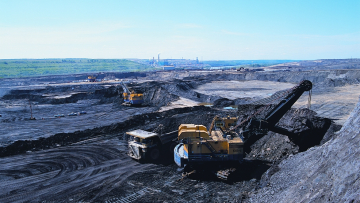Project – On record
This profile is no longer actively maintained, with the information now possibly out of dateBankTrack
Elena Gerebizza, Re: Common, Italy
Project – On record
This profile is no longer actively maintained, with the information now possibly out of dateBankTrack
Elena Gerebizza, Re: Common, Italy
What must happen
Eni shareholders should support a moratorium on any further investment by Eni in tar sands development.
They should also urge Eni's management to implement all the recommendations on the company’s investments in Congo and on its overall portfolio, such as:
- Implement all the recommendations made by Amnesty International in relation to oil company operations in Nigeria in its Congo operations and its entire portfolio of investments.
- In particular, facilitate an independent review of the company’s environmental management processes, and fully overhaul community engagement practices and ensure oversight of the community engagement process.
- Make free, prior and informed consent (FPIC) a condition of all project investments in developing countries, in particular in those with weak human rights and environmental protection, including Congo.
- Report to shareholders and disclose to the general public in its Sustainability Report detailed per project information on greenhouse gas emissions and on how Eni's investments are contributing to the Italian government’s commitments to support reduction of GHG emissions.
| Sectors | Oil and Gas Extraction |
| Location |
|
Oil sands are a mixture of bitumen and sand. Oil sands production is a carbon-intensive process because it is a hugely inefficient way of extracting and refining the oil. For surface deposits, sixty foot tall excavators scrape off the topsoil and dump the sands below into trucks as big as a house. For deeper deposits, steam is produced to warm up the sands. Further energy is required to separate the tarry residue and convert it into oil.
Eni, formerly the Italian state oil company, is one of the top ten energy companies in the world. It is still 30% owned by the Italian state. Eni is undertaking a new multi-billion dollar investment in Congo in developing among others tar sands. This would be the first tar sands project in Africa.
Eni's tar sands exploration is taking place over a huge 1,790 KM2 area. The Congo Basin is both a key resource for local people and a giant carbon sink that plays an increasingly vital role in protecting our climate. Eni says the project will not take place on rainforest and areas of high biodiversity or involve resettlement of people. Yet Eni's own studies estimate the tar sands zone comprises 50 to 70% rainforest and other highly environmentally sensitive areas.
Eni estimates the deposits in the Congo basin at 500 million barrels of bitumen risked and up to 2.5 billion barrels unrisked. 'Risked' refers to volumes of hydrocarbon resources that are not yet discovered but are expected to be eventually recovered from the reservoir. 'Unrisked' resources are in-place resources, of which there is no certainty that any portion will be discovered and which may not be economically viable or technically feasible to produce. The size of the recoverable Congo Basin tar sands resource is thus as yet unknown.
The only place on earth where tar sands are currently developed on industrial scale is Canada, in the region of Alberta. Here, the huge mines and tailings ponds (where toxic waste water is pumped) are so large they can be seen from space. Many problems being faced in Canada because of the tar sands production might also become a serious threat for the Congo basin, once Eni starts its tar sands exploration.
Social and human rights impacts
Congo is among the poorest countries in Africa: about 70% of its population lives below the poverty line, while about 25% of the people enjoy secure access to energy. Yet, Congo is one of the main oil exporters of the continent: oil accounts around 90% of Congo 's export earnings (around USD 4.4 billion in 2008).
Several human settlements are located in the area of the tar sands concession. Several communities live in the vicinty of M'Boundi oil field, near the tar sands concession, operated by Eni since 2007. Communties suffer already severe environmental and social impacts by the regular oil exploration by Eni. Concerns raised by local people range from lack of compensation for land lost to oil developments and for destruction of trees or crops, through lack of local employment opportunities, to concerns over water and air pollution. The ongoing health impacts and pollution caused by gas flaring from the Mboundi field are of particular concern. A further concern is related to how the water injection used to increase production levels at M’Boundi is impacting water resources in the area.
The impact of tar sands development in the Alberta region have been particularly felt by First Nations citizens, who live near, or downstream from, the projects. While some have benefited from increased employment opportunities, many feel that the benefits are outweighted by the environmental and cultural losses. The main concerns of First Nations communities are about the health effects of tar sands developments. Studies have found that Fort Chipewyan, downstream from the Alberta tar sands mines, has a cancer rate 30% higher than expected.
Adequate compensation for land loss is a compelling issue in Congo. Different laws regulate compensation for damage to agricultural crops and land expropriation for 'public' use. The government is in charge of compensation, but it only compensates for land lost to oil developments in cases where it can be proved to be in use. This is often difficult to prove in rural communities in the country. Eni has stated that: "it is not enough for the company to be compliant with the National Legal System when International Standards proved [sic] to be higher". Eni should therefore ensure that compensation is agreed over and above the legal minimum that adequately reflects the impacts of its oil activities as experienced by communities.
ENI has not engaged with local communities about the design or implementation of the tar sands investment, including their potentially serious impacts. Field research in Congo in January-April 2009 revealed an almost total lack of public awareness of Eni’s overall investments. In terms of the tar sands development, some villagers interviewed were aware of the tar sands existence where bitumen is visible on the surface and because of Eni Congo’s sampling programme in the Dionga forest area near the village of M'Boukou. The impacts of sampling were clear to the field researchers, and reported as significant for the farmers who had lost land to the bulldozers used to clear access routes to sampling sites. An unknown number of farmers have lost land in this way. Four farmers who were interviewed stated that they (and others) were not consulted prior to the destruction of their land and crops, and that no compensation has been paid.
Lack of free, prior, and informed consent of the local communities and lack of transparency on the development of the tar sands investment are major concerns for the local and international civil society groups.
Environmental and climate impacts
Eni’s investments in tar sands is inherently high-risk. In other parts of the world, such investments have been heavily criticized for causing social and environmental damage, both locally and globally.
The Congo Basin is both a key resource for local people and a giant carbon sink that plays an increasingly vital role in protecting our climate. Tropical forests cover around two-thirds of Congo and are its second most important source of income. The tar sands permit zone is around 20km distant from the Conkouati-Douli National Park, to the West, while its South Eastern corner overlaps part of the Dimonika UN biosphere. Conkouati-Douli is a protected area described by the government as "the most ecologically diverse habitat in Congo" and "home to an extraordinarily diverse range of fauna, with marine species such as manatees, turtles, dolphins and whales, and many terrestrial threatened spieces, such as forest elephants, gorillas, chimpanzees, mandrills and forest buffalos".
The concession area includes important hydraulic networks, including the Kouilou river, which is categorized by BridLife International as an Important Bird Area (IBA).
Yet, environmental protection, including forestry sector governance, in Congo is very weak. Congo has no functioning environmental regulation and little enforcement capacity. A framework environmental law exists (Loi 003/1991 sur la protection de l'environnement) but this law has not been followed by the adoption of any executive regulation (décret d’application), so there is no means of enacting or enforcing it. According to the country's independent forest monitor, Congo forests are seriously under threath due to the rapid growth of extractive activities and the industrial exploitation of natural resources.
Eni has stated publicly that none of the investments will take place on rainforest or other areas of high biodiversity and will not involve resettlement of people. Yet the company’s own studies reveal that the tar sands exploration zone comprises up to 70% primary forest and other highly bio-diverse areas. It also includes human settlements. There is no clarity as to what extraction and processing technologies Eni will use for the tar sands and it is impossible to predict the project’s impacts on the country’s water and energy resources.
Extraction of tar or bitumen and its processing into synthetic crude is extremely intensive in water and energy use. In Alberta, Canada, the only place where tar sands are currently being developed, it has led to water depletion and pollution, with health impacts on communities, deforestation of Canada’s boreal forest and habitat destruction.
Production of a barrel of tar sands bitumen is 3-5 times more intensive in terms of GHG emissions than production of a barrel of conventional oil. Canada now has the highest emissions per capita of any G8 country and is being increasingly criticized for its inaction on climate change. Many civil society groups, local indigenous residents and scientists are now calling for a moratorium on new tar sands investment.
Other impacts
The risks of Eni's investments are heightened by the governance deficit within Congo, lack of transparency and community consultation and the area’s ecological sensitivity. In the World Peace Foundation's Index of African Governance, Congo was categorized as one of the worst performing ten countries. Mismanagement of wealth by corrupt local elites, with the complicity of corporate interests has been extensively documented by civil society activists who have long campaigned to clean up the country's public finances and ensure that its natural resource wealth goes to poverty reduction.
None of the terms of the agreements signed between Eni and the Congolese government are publicly available due to a confidentiality clause.
Eni has recently won awards for promoting sustainability in its business model - indeed, it is the world's most 'sustainable' oil and gas company, according to the Dow Jones Iindex.
2009
2009-11-18 04:11:38 |
In May 2008 Eni signed an agreement with the Republic of Congo for a four-year, 3-billion-euro deal to develop a tar sands prospect in the African nation. Exploration and testing is ongoing in the area included in the concession. Hence no information is available for the local communities and the general public on the actual plans for the project development. At present (November 2009) the company still has about two years remaining on its exploration permit and is continuing its exploration of the development potential of the zone.





